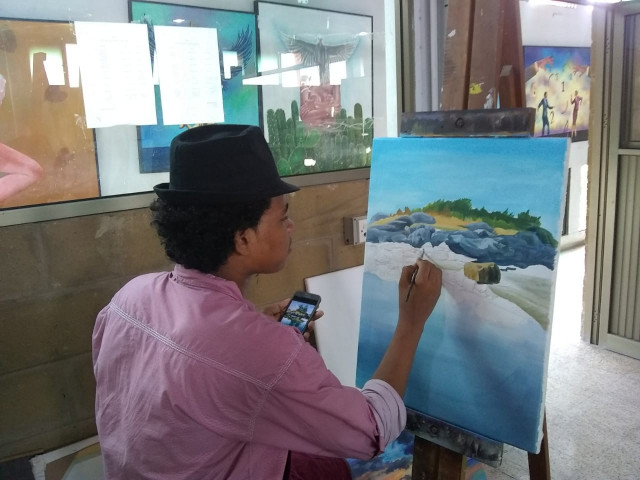ACIAC aims to paint a brighter future for fine arts in Pakistan
Administration aiming to revive historic institute; achieve degree-awarding status in three years

ACIAC aims to paint a brighter future for fine arts in Pakistan
ACIAC, the first official institute for fine arts in Pakistan, was established in 1964. For the next 55 years, it was nurtured by the most brilliant artists of the time including Faiz Ahmed Faiz and Zulfiqar Ali Bukhari. The first principle of the institute was Ali Imam. Renowned artists, Ahmed Parvez, Sadequain, Naheed Raza, Shakil Siddiqui, Nilofer Farrukh and Shakil Ismail, studied at the prestigious institute.
The gradual decline of its quality, and consequently prestige, began when the control of the institute shifted. During this time, many things associated with the institute, like paintings and records of its students, were moved to other places.
The vision
Renowned artist and the incumbent principal of the institute, Shahid Rassam, said that the institute provides all the art materials needed free of charge to its students. He added that while the institute is currently offering diploma programmes, it will begin offering degree programmes starting next year. The institute aims to establish itself as a university in the next three years.
According to Rassam, a society is known by its artists. He added that art is not just a skill but a proper form of study and a profession just like other professions such as medicine, engineering and others.
The principal said that apart from providing scholarships to deserving students, one of the major goals of the institute was to restore its historic status.
Recognising deserving students
Anyone entering the institute, located above the Ahmed Parvez Gallery at Arts Council, will find many students seated on the floors, behind glass or concrete walls holding brushes and pencils against canvasses. They are residents of areas like Lyari, Landhi, Surjani Town, New Karachi, etc. and have proven themselves worthy of the scholarships they have been given.
The gold medallist for the year, Jawad Baloch, hails from Lyari where he used to work at a painter's shop. While he used to earn a mere Rs800 per week there, he realised his talent in art. His father is serving as a peon in Pakistan Railways and had it not been for ACIAC, studying fine arts may have remained a dream. The institute recognised his talents and helped him polish his skills.
There are many youngsters who share a similar story. Raza Haider, a resident of Aram Bagh, is also a student at ACIAC. His father fills forms outside the passport office. Ramsha is a resident of New Karachi and her father is a librarian. Similarly, Behzad is also a student and his father works at an embroidery shop in Laloo Khait.
In fact, Rassam himself spent his life in poverty and distress. He shared that his circumstances were no different from the circumstances of these children. His mother used to stitch clothes to earn money and he had to struggle a lot for his passion for art. He had to collect pennies for three years before he could buy his first set of colours.
Above and beyond
The institute also recognises the importance of grooming its students. To this end, they offer courses to learn and improve English and Urdu.
Additionally, ACIAC is introducing exchange programmes in collaboration with Iran, China, British Council, Illinois Francis, Goethe Institute and the United States of America. Rassam shared that they were demanding that government scholarships be offered through ACIAC.
The institute also plans to introduce another programme for hearing and speech impaired persons.
According to Rasam, creating links with the industry is also important and the institute has also worked on this front. The students make use of these links and join various media houses and advertising companies once they've graduated.
Restoring the institute
ACIAC was an independent institute before, but after a long struggle in which the Arts Council won the court case, the council managed to bring it under its umbrella. Now, sponsored by some generous people, efforts are being made to revive the institute. To this end, a board has been established comprising Ishrat Husain, Shaukat Tarin, Marjorie Husain and Anwar Maqsood.
It is hoped that once more, the arts will find a home at ACIAC.



















COMMENTS
Comments are moderated and generally will be posted if they are on-topic and not abusive.
For more information, please see our Comments FAQ